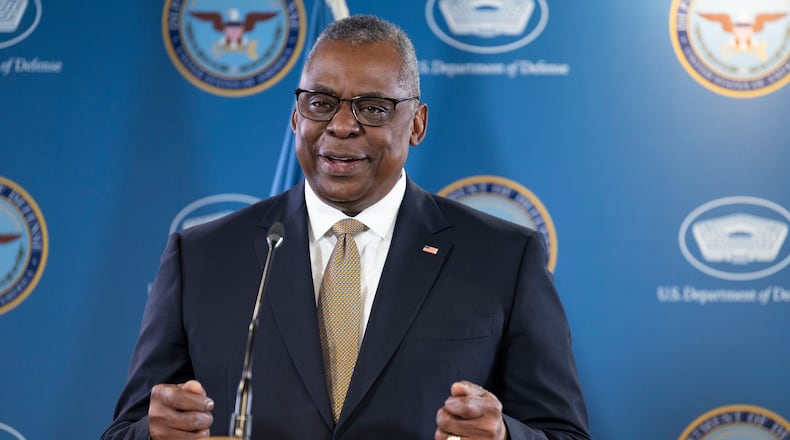Dan Meyer, a partner with law firm Tully Rinckey, who practices in the area of federal employment law and security clearances, is a former GS-15 and U.S. Navy officer.
Meyer, who practices in Washington, D.C., said the DOD’s new approach will probably make it tougher to get and keep security clearances.
The changes may lead to fewer contractors with clearances, he said.
But that’s not necessarily his expectation for work around Wright-Patterson, where the National Air and Space Intelligence Center and the National Space Intelligence Center are located.
“Those have actually been pretty cost-effective,” Meyer said. “And manpower-wise, they are really effective. Think about it: Time was, a lot of those positions would have been on the two coasts, either in Washington or Los Angeles. A lot of the reasons why the centers were placed in the Dayton area … is that the cost of maintaining an employee is cheaper than in Washington, D.C.”
“You can get really well educated people, smart people and you can get them probably for about two-thirds the cost of a billet (job with access to sensitive information) in the Washington, D.C. area,” he said.
But Guard and Reserve units are “going to take it on the chin,” when it comes to losing clearances, he suspects.
The subject is a sensitive one. Several Dayton-area contractors declined to comment for this story, saying they are grappling with how the new landscape may affect them.
Nearly three million people, both government employees and contractors, held federal security clearances in 2019, according to the Office of the Director of National Intelligence. Of those, 1.7 million held confidential or secret clearances and about 1.3 million held top secret access.
A June 30 DOD memo says that DOD component heads who are not part of the federal Intelligence Community need to validate the “continuing need” for their personnel to have access to sensitive compartmented information, which is information about intelligence sources and methods.
Secretary of Defense Lloyd Austin also wants to ensure those people have valid nondisclosure agreements on file by Sept. 30.
Meyer said the accusations surrounding Airman 1st Class Jack Teixeira are just the latest in a “long string of issues.”
Teixeira pleaded not guilty in June to federal felony charges. He is accused of leaking highly classified military documents in a chatroom on Discord, a social media platform for gamers.
After the events of Sept. 11, 2001, “We reclassified a whole bunch of decisions requiring clearances that did not need them,” Meyer said. “So there are far more clearances out there, with the DOD in particular, than are necessary.”
“The problem is, the Defense Department has really grown reliant on that contracting workforce,” he said.
“We’ve got to retrench, and we’ve got to pull back, and nobody has quite figured out how to do that,” he added.
Too many flag officers and high-ranking officials had their own personal SCIF (a “Sensitive Compartmented Information Facility” or a secure room), even within the Pentagon, Meyer said. “It just attracted classified information like dust.”
Secretary Austin’s changes call for increased levels of physical security, additional controls to ensure documents aren’t improperly removed, and the assignment of top-secret control officers to monitor users, the Associated Press reported.
‘You have to be comfortable living in this world’
The challenge is that it’s always easier to grow an agency than to shrink it, Meyer said.
Federal employees who are “sloppy security citizens” need to rededicate themselves to the guidelines for workers who have security clearances, he said.
They shouldn’t lie as a matter of integrity, he said. No smoking marijuana or drug use. No DUIs. No revolving credit card balances. No excessive gambling. Sexual activity needs to be “consensual and non-criminal,” he said.
“You have to be comfortable with living in this world, and if you’re not, then you need to leave and go someplace else,” Meyer said.
In early 2022, Wright State University announced a partnership with Dayton defense contractor Infinity Labs that, among other things, created a security clearance acceleration program for students and interns.
Jason Molnar, a former decorated Army officer and Infinity’s chief strategy officer, declined to comment on how the recent DOD changes may affect that work. A Wright State spokesman said he did not know yet how the program might change.
Retired Air Force Col. Cassie Barlow, a former commander of the 88th Air Base Wing at Wright-Patterson, said the major changes will be in training guidance for people who work with sensitive materials.
“I don’t believe at this point that any changes will make it more difficult for federal contractors to support the base or for individuals to obtain a clearance,” Barlow said. “Our country has robust and strict guidance on access to sensitive materials to best protect the people of our country and the importance of following this guidance can not be overstated.”
About the Author





